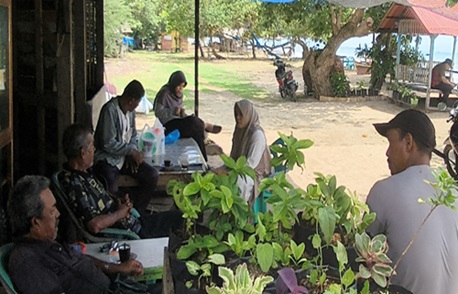Peningkatan Manajemen Wisata Berbasis Eco-Smart Tourism sebagai Upaya Pembangunan Berkelanjutan
Improving Eco-Smart Tourism Management as a Strategy for Sustainable Development
DOI:
https://doi.org/10.33084/pengabdianmu.v10i1.8388Keywords:
Eco-tourism, Information technology, Tourism managementAbstract
The development of ecotourism-based tourism has emerged as an effective strategy to utilize local resources to boost the economy of local communities. Community-based ecotourism encourages active participation from residents, leveraging their knowledge of natural assets as tourist attractions. Active community involvement in managing tourism destinations, from planning to implementing ecotourism activities, is key to preserving these natural resources while enhancing their economic value as tourist attractions. This approach ensures that environmental sustainability is maintained, and economic benefits are directly experienced by the community.
Downloads
References
Dianasari, D. A. M. L. (2019). Peran Masyarakat Dalam Pengembangan Desa Nyambu Sebagai Desa Wisata Ekologis. Jurnal Kepariwisataan, 18(2), 1–10. https://ejournal.ppb.ac.id/index.php/jpar/article/view/378
Fatahudin, M., Purwanto, M. Y. J., & Rau, M. I. (2021). Perencanaan Pengembangan Prasarana Kawasan Ekowisata Situ Gede Kota Bogor. Jurnal Teknik Sipil Dan Lingkungan, 6(1), 49–60. https://doi.org/10.29244/jsil.6.1.49-60
Fitrisna Widyasari, B., Akiriningsih, T., & Suharto. (2022). Partisipasi Masyarakat Dalam Mendukung Kegiatan Pariwisata Di Desa Wisata Hijau Bilebante Kabupaten Lombok Tengah. Sabbhata Yatra: Jurnal Pariwisata Dan Budaya, 3(2), 94–103. https://doi.org/10.53565/sabbhatayatra.v3i2.638
Giampiccoli, A., & Saayman, M. (2018). Community-based tourism development model and community participation. African Journal of Hospitality, Tourism and Leisure, 7(4), 1–27. https://www.ajhtl.com/uploads/7/1/6/3/7163688/article_16_vol_7_4__2018.pdf
Hanum, F. (2020). Konsep Smart Tourism sebagai Implementasi Digitalisasi di Bidang Pariwisata. Tornare, 2(2), 14–17. https://doi.org/10.24198/tornare.v2i2.25787
Iswahyudi, Fadlon Haser, T., & Abdurrachman. (2019). Strategi Pengembangan Ekowisata Berkelanjutan Di Hutan Mangrove Kuala Langsa Kota Langsa Sustainable Ecotourism Development Strategy for Mangrove Forest of Kuala Langsa, Langsa City. Jurnal Ilmu Pertanian Tirtayasa, 1(1), 2019. https://jurnal.untirta.ac.id/index.php/JIPT/article/view/6851
Kaharuddin, K., Pudyatmoko, S., Fandeli, C., & Martani, W. (2020). Partisipasi Masyarakat Lokal dalam Pengembangan Ekowisata. Jurnal Ilmu Kehutanan, 14(1), 42. https://doi.org/10.22146/jik.57462
Nugroho, I., Pramukanto, F. H., Negara, P. D., Purnomowati, W., & Wulandari, W. (2016). Promoting the Rural Development through the Ecotourism Activities in Indonesia. American Journal of Tourism Management, 5(1), 9–18. https://doi.org/10.6084/m9.figshare.6265169
Putra, A. B. N. R., Winarno, A., Purnomo, Habibi, M. A., Satyananda, D., Agustina, Y., & Kiong, T. T. (2021). Peningkatan daya tarik dan wawasan wisatawan dengan pembangunan Eco-Smart Mini Lab sebagai wisata edukasi alam. Jurnal Karinov, 4(1), 2–7. http://dx.doi.org/10.17977/um045v4i1p%25p
Sayektiningsih, T. (2019). Community Perceptions of Impacts of Ecotourism and Its Implications on Ecotourism Development in the Balikpapan Bay, East Kalimantan. Jurnal Wasian, 6(1), 57–67. https://doi.org/10.20886/jwas.v6i1.4666
Sinarta, I. N., Candrayana, K., & ... (2021). Pkm Dengan Tim Pengembangan Desa Wisata Dalam Perencanaan Masterplan Infrastruktur Ekowisata Di Desa Besang Kawan. Jurnal Abdi Jaya, 1(2), 23–32. https://www.ejournal.warmadewa.ac.id/index.php/mrill/article/view/4148
Siswanto, A. (2010). Strategi Pengembangan Ecotourism Taman Nasional Baluran di Kabupaten Situbondo. http://digilib.uinkhas.ac.id/2281/
Stronza, A., & Gordillo, J. (2008). Community views of ecotourism. Annals of Tourism Research, 35(2), 448–468. https://doi.org/10.1016/j.annals.2008.01.002
Utomo, B., Mulki, G. Z., & Fitriani, M. I. (2019). Pengembangan Ekowisata Berbasis Patisipasi Masyarakat di Desa Jeruju Besar Kecamatan Sungai Kakap. Jurnal Elektronik Laut, Sipil Dan Tambang, 6(2), 1–10. https://doi.org/10.26418/jelast.v6i2.35156
World Tourism Organization. (2013). Sustainable Tourism for Development Guidebook - Enhancing capacities for Sustainable Tourism for development in developing countries. In Sustainable Tourism for Development Guidebook - Enhancing capacities for Sustainable Tourism for development in developing countries. https://doi.org/10.18111/9789284415496
Zainal, M., Yanis, M., & Putra, R. A. (2023). Peningkatan Manajemen Wisata Berbasis Teknologi Informasi di Desa Iboih, Kota Sabang. Wikrama Parahita: Jurnal Pengabdian Masyarakat, 7(1), 1–10. https://doi.org/10.30656/jpmwp.v7i1.5452

Downloads
Published
How to Cite
Issue
Section
License
Copyright (c) 2025 Firdasari Firdasari, Nova Purnama Lisa, Ellida Novita Lydia

This work is licensed under a Creative Commons Attribution-ShareAlike 4.0 International License.
Authors who publish with this journal agree to the following terms:
- Any article on the copyright is retained by the author(s).
- Author grant the journal, right of first publication with the work simultaneously licensed under a Creative Commons Attribution License that allows others to share work with acknowledgment of the work authors and initial publications in this journal.
- Authors are able to enter into a separate, additional contractual arrangements for non-exclusive distribution of published articles of work (eg, post-institutional repository) or publish it in a book, with acknowledgment of its initial publication in this journal.
- Authors are permitted and encouraged to post their work online (e.g., in institutional repositories or on their websites) prior to and during the submission process, as can lead to productive exchanges, as well as earlier and greater citation of published work.
- The article and any associated published material is distributed under the Creative Commons Attribution-ShareAlike 4.0 International License










